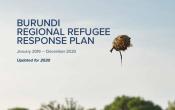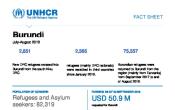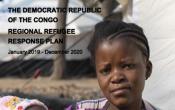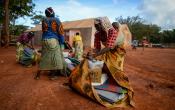Burundi
Operation: Burundi
Location
{"longitude":30,"latitude":-3,"zoom_level":8,"iso_codes":"'BDI'"}
By clicking on the icons on the map, additional information is displayed.
The boundaries and names shown and the designations used on this map do not imply official endorsement or acceptance by the United Nations.
Key Figures
| 2019 year-end results | |
| 100% | coverage rate for the Prevention of Mother-To-Child Transmission of HIV/AIDS programme. |
| 80,000 | registrations of urban and camp-based refugees were verified using the Biometric Information Management System. |
| 12,900 | camp-based children benefited from primary education, while 4,300 youths were enrolled in secondary school. |
| 3,740 | refugees were submitted for resettlement or 94% of the target of 4,000 individuals. Some 2,930 refugees departed to six resettlement countries. |
| >80% | of repatriated families were interviewed and benefitted from protection monitoring. |
| 80% | of refugees had access to health care. |
| 60% | of households lived in adequate dwellings. |
| 2020 planning figures | |
| 100% | of people of concern registered on an individual basis |
| 100% | of known sexual and gender-based violence survivors receive appropriate support |
| 95% | of primary school-aged refugee children enrolled in primary education |
| 95% | of people of concern identified as needing resettlement will be submitted for it |
| 75,000 | Burundian returnees receive transportation assistance |
Latest Updates and Related Links
People of Concern
7%
Decrease in
2019
2019
| 2019 | 144,791 |
| 2018 | 156,392 |
| 2017 | 195,530 |

[["Refugees",78473],["Asylum-seekers",9003],["IDPs",33256],["Returned refugees",21181],["Stateless",974],["Others of concern",1904]]
Loading ...
Burundi
< Back
2019
{"categories":[2015,2016,2017,2018,2019,2020],"budget":[33.021793127,34.53884162,33.81553606,33.00214314,50.92459511,56.76049354],"expenditure":[15.61407482,17.32505948,19.60250263,27.31731118,22.35627834,null]}
{"categories":[2015,2016,2017,2018,2019,2020],"p1":[18.676158177,28.50049693,29.42440961,32.49367779,46.82598187,52.66187944],"p2":[0.18940178,0.92834469,0.007075,null,0.012017,0.012017],"p3":[null,null,null,null,2,2],"p4":[14.15623317,5.11,4.38405145,0.50846535,2.08659624,2.0865971]}
{"categories":[2015,2016,2017,2018,2019,2020],"p1":[14.14254743,15.49302301,17.78705999,26.84660657,22.27789605,null],"p2":[0.13616865,0.1221779,null,null,null,null],"p3":[null,null,null,null,null,null],"p4":[1.33535874,1.70985857,1.81544264,0.47070461,0.07838229,null]}
Loading ...
CHOOSE A YEAR
- 2014
- 2015
- 2016
- 2017
- 2018
- 2019
- 2020
Operational environment
UNHCR operations in Burundi were affected by a deepening socio-economic situation and humanitarian crisis characterized by high malnutrition rates and limited livelihood opportunities. Burundi’s protection environment remained complex throughout 2019. Challenges in UNHCR and Government relations constrained humanitarian access. The Government’s efforts to enforce 2017 legislation, requiring ethnic quotas for the Burundian staff of international NGOs, resulted in some partners discontinuing their operations in Burundi. Protection delivery and response, as well as durable solutions for protracted refugee caseloads, were impacted as a resultDespite significant funding gaps in the response plan for refugees in Burundi, the country continued to uphold its open-door asylum policy, hosting over 87,000 refugees and asylum-seekers – most of whom were from the Democratic Republic of the Congo (DRC).
A persistent pattern of human rights violations which led over 400,000 Burundian nationals to flee since April 2015 remained largely unresolved, while new political tensions in the lead-up to the May 2020 elections drove more Burundians into exile. Conditions remained thus unconducive to large-scale, sustainable return. Nonetheless, UNHCR continued to facilitate the repatriation of Burundian refugees on a voluntary basis, mainly from the United Republic of Tanzania (Tanzania), as well as small numbers from Kenya and the DRC. The regional refugee response and reintegration plans for Burundian returnees, however, both remain largely underfunded.
At the Global Refugee Forum in December 2019, Burundi pledged to finalize its accession to both statelessness conventions.
Population trends
The total number of refugees and asylum-seekers in Burundi stood at nearly 87,500 – representing a 12% increase from 2018 and including over 11,300 refugees and asylum-seekers fleeing insecurity from the DRC’s South Kivu province. Nearly 21,200 Burundian refugees returned during the year, with most returning from Tanzania. According to IOM, nearly 80,700 Burundians were internally displaced throughout the year, largely due to natural disasters (floods) and climate-change resulting in food insecurity. Burundi was also host to nearly 1,000 Omani nationals who were at risk of statelessness.Key achievements
A new carbon-free refugee camp was built in Nyankanda, Ruyigi, with a solar-powered biomass briquettes production unit, which supplements insufficient cooking fuels and provides both refugees and host communities with income-generating activities. A new returnee transit center was built in Kinazi, Muyinga, to temporarily accommodate arriving returnees. A partnership agreement was signed with Lumitel for mobile money transfers to refugees and returnees in order to implement cash-based interventions. Returnee monitoring was undertaken in all areas of return to inform programming.Unmet needs
- The Burundi operation received 45% of required funds in 2019. The lack of funding impacted the level of assistance that was provided in both urban and camp refugee settings.
- Minimum standards in water and sanitation were unmet, also as a result of underfunding, as was the provision of food assistance, non-food items and core relief items including hygienic kits in transit centers and camps.
- Owing to budget constraints UNHCR was not able to provide capacity building for government authorities and technical staff on international protection and asylum management. Further, budget constraints led to a shortfall in legal aid for refugee status determination, and delays in obtaining card printers and cartridges in order to print refugee identification cards.
- Activities targeted at IDPs were limited, which hampered the mainstreaming of protection across all sectors.
Working Environment
UNHCR operates in the context of an ongoing volatile political, socio-economic and humanitarian situation. Movements of Burundians due to political repression, dire socio-economic conditions and threats to livelihoods are likely to continue in 2019. Simultaneously, returns continue at increasing rates against the backdrop of the challenging conditions in Burundi.Despite the economic hardship, the Government maintains its open-door policy and provides protection to refugees and asylum-seekers. However, the effective access of people of concern to basic social services such as health or education, as well as to the labour market remains limited throughout the country.
In 2019, UNHCR will reinforce its advocacy with the Government and UN partners in Burundi to include not only the refugee populations but also Burundian returnees into relevant reintegration initiatives. It will also build strong coordination mechanisms with its implementing partners on the ground to enhance advocacy for an improved nexus between humanitarian and development aid. UNHCR works in the framework of the Regional Refugee Response Plans including the plan for the Congolese situation. While the situation of Congolese refugees remains dire, UNHCR will increase its efforts to ensure that Congolese refugees gain effective access to basic social services in Burundi, are considered in empowerment and resilience building initiatives, and that durable solutions will be found for them.
Despite continuous fundraising efforts, the UNHCR’s operation in Burundi remains underfunded. This has a negative impact on the overall capacity of UNHCR to provide assistance to refugees and returnees.
Key priorities
In 2019, UNHCR will prioritize the provision of protection and assistance to the populations of concern in Burundi, including durable solutions to refugees in the five camps across the country, as well as the continuation of a voluntary repatriation programme for Burundian returnees. Although UNHCR is currently not promoting returns to Burundi, it supports those who have expressed the desire to return in safety and dignity. In this regards, UNHCR runs the voluntary repatriation operation allowing Burundian refugees in the sub-region to return in a way which lays the best possible foundation for their durable reintegration.UNHCR will focus its strategy on the preservation of the civilian and humanitarian character of asylum, ensuring respect for the principle of non-refoulement; the delivery of protection and the provision of assistance (essential basic services) to refugees and people seeking asylum, both in camps and urban areas of Burundi; and the inclusion of returnees into sustainable reintegration initiatives.























